Ephrem the Syrian Quotes
About Author
Ephrem the Syrian (; c. 306 – 373), also known as Ephraem the Deacon, Ephrem of Edessa or Aprem of Nisibis, (Syriac: ܡܪܝ ܐܦܪܝܡ ܣܘܪܝܝܐ — Mâr Aphrêm Sûryâyâ) was a prominent Christian theologian and writer who is revered as one of the most notable hymnographers of Eastern Christianity. He was born in Nisibis, served as a deacon and later lived in Edessa.
Ephrem is venerated as a saint by all traditional Churches. He is especially revered in Syriac Christianity, both in East Syriac tradition and West Syriac tradition, and also counted as a Holy and Venerable Father (i.e., a sainted monk) in the Eastern Orthodox Church, especially in the Slovak tradition. He was declared a Doctor of the Church in the Catholic Church in 1920. Ephrem is also credited as the founder of the School of Nisibis, which in later centuries was the center of learning for the Church of the East.
Ephrem wrote a wide variety of hymns, poems, and sermons in verse, as well as prose exegesis. These were works of practical theology for the edification of the Church in troubled times. His performance practice of all-women choirs singing his madrāšê (teaching hymns) was particularly notable, and from it emerged the Syriac Christian tradition of "deaconess" choir members. Ephrem's works were so popular that, for centuries after his death, Christian authors wrote hundreds of pseudepigraphal works in his name. He has been called the most significant of all the fathers of the Syriac-speaking church tradition, the next most famous after him being Jacob of Serugh and Narsai.
Ephrem is venerated as a saint by all traditional Churches. He is especially revered in Syriac Christianity, both in East Syriac tradition and West Syriac tradition, and also counted as a Holy and Venerable Father (i.e., a sainted monk) in the Eastern Orthodox Church, especially in the Slovak tradition. He was declared a Doctor of the Church in the Catholic Church in 1920. Ephrem is also credited as the founder of the School of Nisibis, which in later centuries was the center of learning for the Church of the East.
Ephrem wrote a wide variety of hymns, poems, and sermons in verse, as well as prose exegesis. These were works of practical theology for the edification of the Church in troubled times. His performance practice of all-women choirs singing his madrāšê (teaching hymns) was particularly notable, and from it emerged the Syriac Christian tradition of "deaconess" choir members. Ephrem's works were so popular that, for centuries after his death, Christian authors wrote hundreds of pseudepigraphal works in his name. He has been called the most significant of all the fathers of the Syriac-speaking church tradition, the next most famous after him being Jacob of Serugh and Narsai.
